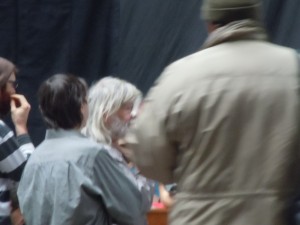Greenwashing…Then and Now
The word “greenwashing” is only a few years old; the practice, unfortunately, goes back much longer.
This morning, for some reason, I woke up thinking about a loaf of bread I saw in the supermarket some time in the early 1980s. This line of bakery products was very clearly marketed to the customer who wanted natural foods, and even back then, that included me. The packaging copy was all about wholesome whole grains, natural growing practices, and such–until I got to the ingredients list.
And there I saw the deal-killer: “calcium propionate added to discourage mold.” Back it went from my hands to the shelf!
I was so deeply offended to see this very common bread additive in a bread marketed as wholesome and natural that I can still recall the exact wording. In fact, I remember telling several friends how corny and false this company was, trying to disguise its use of chemicals by saying “discourage” instead of the more typical, and harsher sounding, “retard mold.”
And that got me thinking about another early greenwashing offender: nuclear power. As a child in the 1960s, and one who was impressed by the promise of technology, I was enchanted by the idea of clean energy that would be “too cheap to meter,” as one prominent nuclear bureaucrat famously put it.
This enchantment didn’t stop me from getting involved in a local group that was questioning the wisdom of a proposed nuke two miles from New York City, but back then, all we knew about was thermal pollution. Thank goodness the utility abandoned that plan!
Two years later, I chose as a college research topic the pros and cons of nuclear power, and started reading in depth. Turns out, thermal pollution is the least of nuclear’s problems. Factor in these:
- Potential for catastrophic accidents that could make Fukushima, Chernobyl, and Three Mile Island look like a romp in the park
- Deeply subsidized limited-liability insurance that means if there is a catastrophe, private citizens aren’t going to collect on their losses without a massive infusion of billions of dollars of government money (this is a US law, the Price-Anderson Act, but many other countries have similar provisions)
- A long and sordid history of literally hundreds of small accidents that could have become big very easily–this link with pictures and descriptions of the nine worst shows that five of the nine were AFTER Chernobyl
- A 250,000-year pollution problem in the need to isolate extremely deadly wastes from the environment for a quarter of a million years (think about how few artifacts remain from even 5000 years ago, and almost nothing of human origin exists from even 30,000 years ago)
- Huge inefficiencies that lead one analyst, John Berger, to conclude that nuclear–counting the entire fuel cycle–had actually consumed five times as much energy as it produced, so all this risk is for NO benefit (I have the full citation in my book, Nuclear Lessons)
And you wonder how any environmentalist (and several very prominent ones have) can endorse this terrible, deeply flawed, and very UN-green technology.



